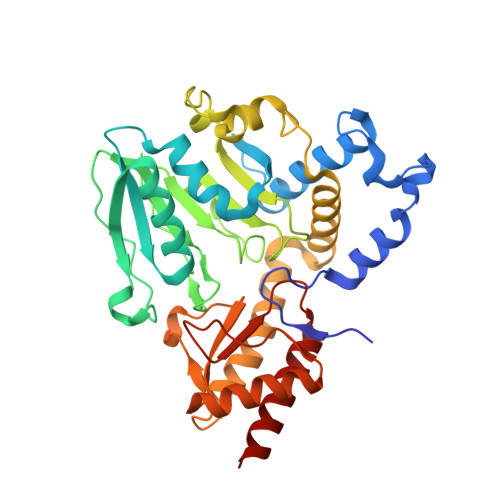Enzyme Adaptation to Alkaline Ph: Atomic Resolution (1.08 A) Structure of Phosphoserine Aminotransferase from Bacillus Alcalophilus
Dubnovitsky, A.P., Kapetaniou, E.G., Papageorgiou, A.C.(2005) Protein Sci 14: 97
- PubMed: 15608117
- DOI: https://doi.org/10.1110/ps.041029805
- Primary Citation of Related Structures:
1W23, 1W3U - PubMed Abstract:
The crystal structure of the vitamin B(6)-dependent enzyme phosphoserine aminotransferase from the obligatory alkaliphile Bacillus alcalophilus has been determined at 1.08 A resolution. The model was refined to an R-factor of 11.7% (R(free) = 13.9%). The enzyme displays a narrow pH optimum of enzymatic activity at pH 9.0. The final structure was compared to the previously reported structure of the mesophilic phosphoserine aminotransferase from Escherichia coli and to that of phosphoserine aminotransferase from a facultative alkaliphile, Bacillus circulans subsp. alkalophilus. All three enzymes are homodimers with each monomer comprising a two-domain architecture. Despite the high structural similarity, the alkaliphilic representatives possess a set of distinctive structural features. Two residues directly interacting with pyridoxal-5'-phosphate are replaced, and an additional hydrogen bond to the O3' atom of the cofactor is present in alkaliphilic phosphoserine aminotransferases. The number of hydrogen bonds and hydrophobic interactions at the dimer interface is increased. Hydrophobic interactions between the two domains in the monomers are enhanced. Moreover, the number of negatively charged amino acid residues increases on the solvent-accessible molecular surface and fewer hydrophobic residues are exposed to the solvent. Further, the total amount of ion pairs and ion networks is significantly reduced in the Bacillus enzymes, while the total number of hydrogen bonds is increased. The mesophilic enzyme from Escherichia coli contains two additional beta-strands in a surface loop with a third beta-strand being shorter in the structure. The identified structural features are proposed to be possible factors implicated in the alkaline adaptation of phosphoserine aminotransferase.
Organizational Affiliation:
Turku Centre for Biotechnology, University of Turku, Finland.
















